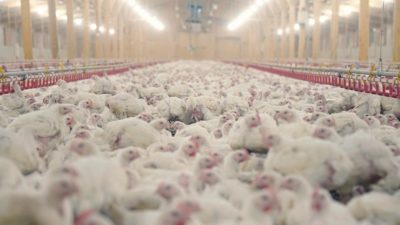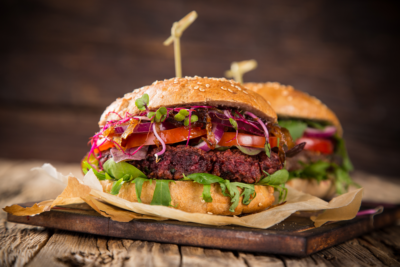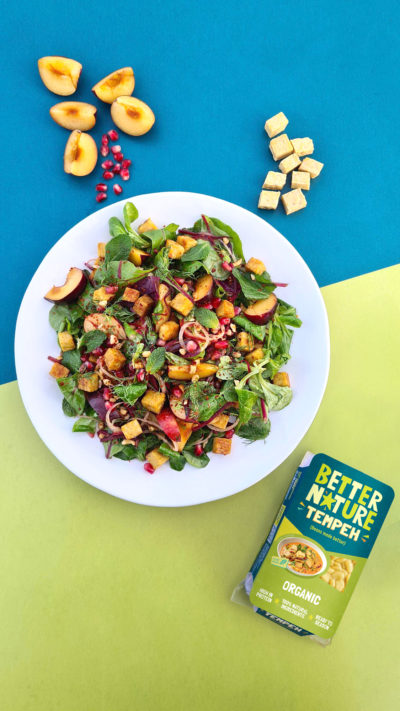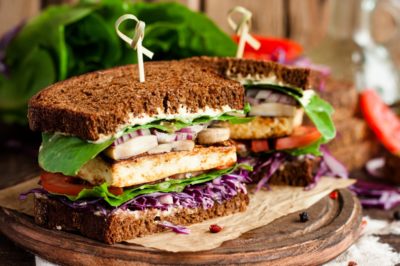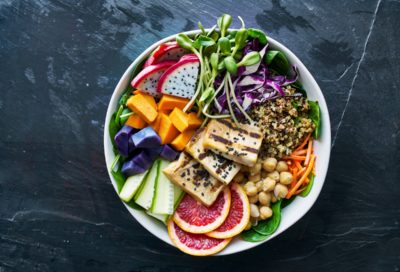Chicken is often hailed as the ultimate fitness superfood, but is this really the case? We explore this below.
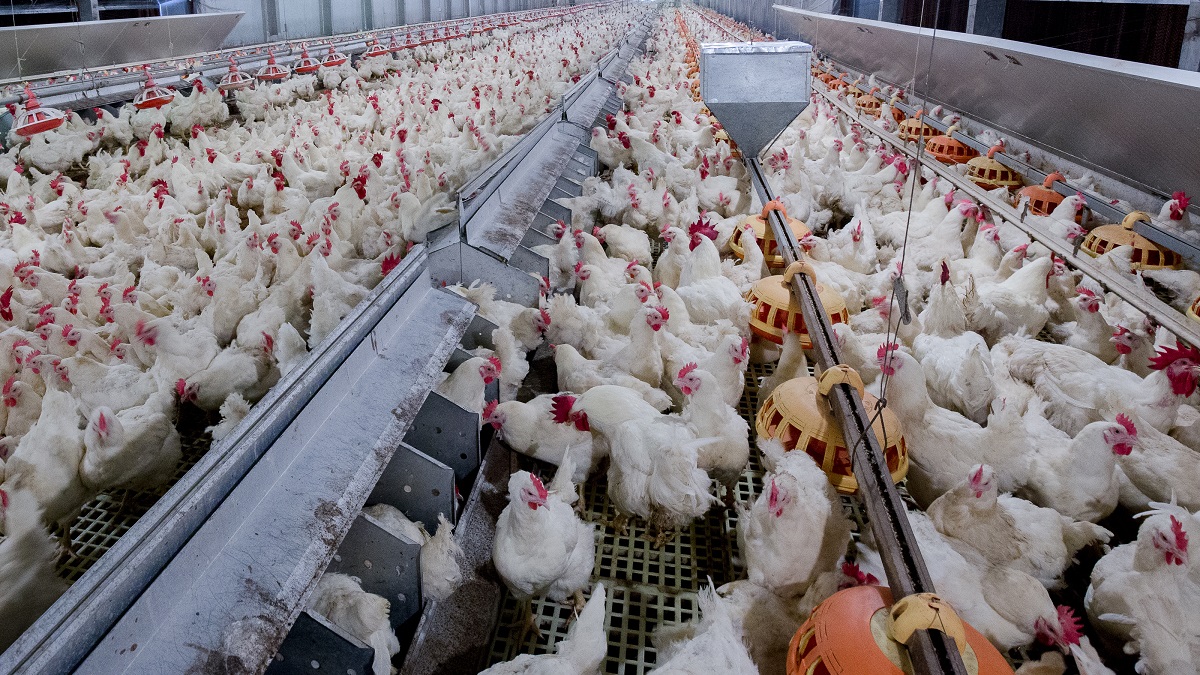
Chicken is presented to us as the pinnacle of ‘clean eating’ and we’re told it’s an ideal source of protein because it’s lower in calories and fat than red meat. But is chicken as healthy as we’re told it is, and how does it compare to plant-based protein sources?
Keep reading to learn why chicken is far from the superfood it’s cracked up to be.
Cholesterol
It is well-documented that high levels of saturated fat and cholesterol are key contributors to heart disease, both of which are abundant in animal-derived foods.
Many people swap red and processed meats for chicken believing it is a healthier alternative, and while of course there are nutritional benefits, chicken is still high in LDL (“bad”) cholesterol when compared to many whole plant-based foods.
Some research has found that white meat raises LDL cholesterol to the same extent as red meat, and therefore makes no difference to heart disease risk. For example, one study compared diets low in saturated fat which obtained protein from red meat, white meat and meatless sources. It found that both red and white meat raised LDL cholesterol compared to the meat-free protein sources such as legumes, grains and nuts.1
As plant-based diets include plenty of whole grains, seeds, nuts, fruits and vegetables, they tend to be naturally lower in saturated fat and many studies have linked plant-based diets to lower cholesterol levels than other dietary patterns.2 In fact, research has found that going meat-free can be just as effective at lowering cholesterol levels than taking medication.3
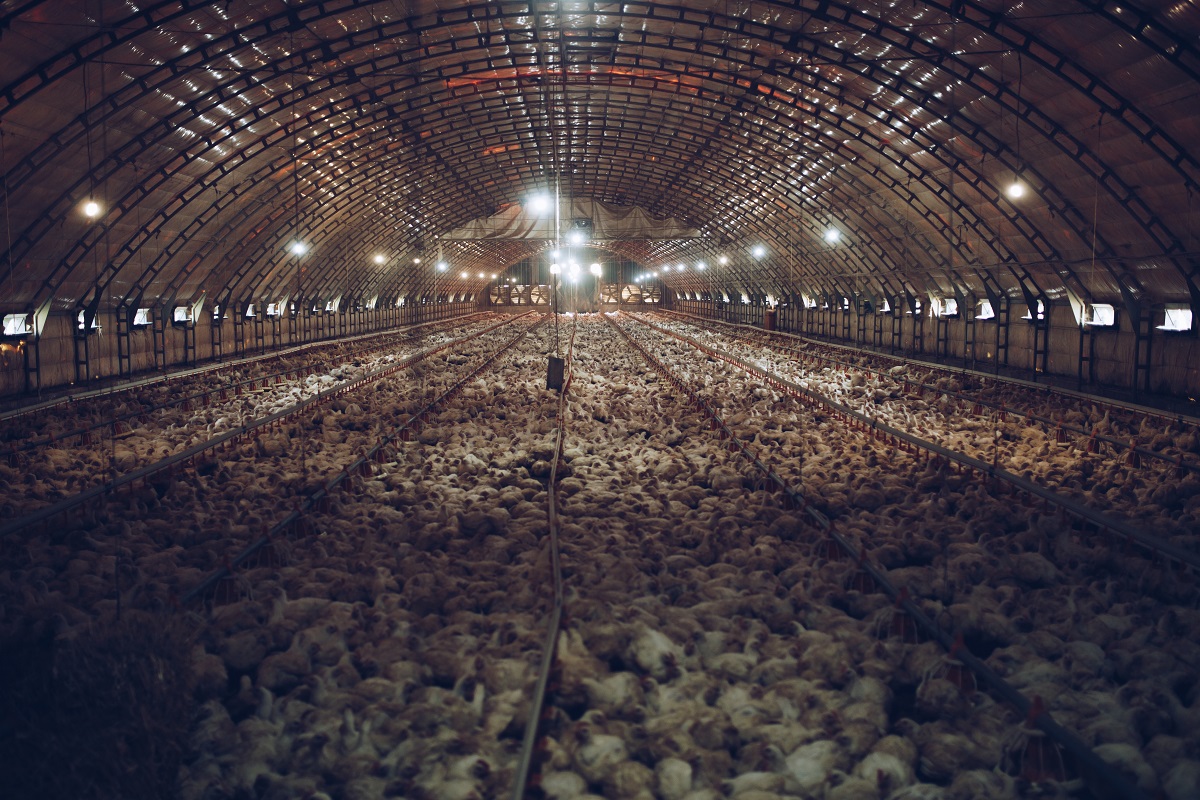
Contamination
It is no secret that chicken is a major cause of food poisoning and salmonella outbreaks are not uncommon in the UK. In 2021, a deadly outbreak resulted in a recall of chicken products from several major supermarkets4 and there was a rise in detected cases between 2020-21, with raw meats such as chicken and turkey being the most commonly contaminated foods.5
More recently, it has been reported that 330 cases of salmonella in humans were linked to infected poultry products (namely chicken and eggs imported from Poland) in 2023. The outbreaks have been so concerning that there have been talks of banning imports from Poland altogether.6
And the problem doesn’t stop there. Campylobacter is another health concern associated with eating chicken products. Even though there is a maximum level of Campylobacter that the Food Standards Agency will accept, there are still concerns that chicken sold in retailers is contaminated with it.7
Most cases of campylobacter infection come from poultry. Recent studies have found over 50% of the chicken sold in the UK carries the bacteria.8
It’s still possible to suffer from food poisoning on a vegan diet, but by swapping chicken for plant-based protein sources, we can omit the biggest cause of foodborne illness.
Antibiotic resistance
Antibiotic resistance is another reason why chicken is far from the “clean” food we’re told it is.
An estimated 75% of all antibiotics in the world are used on farmed animals.9 Instead of using antibiotics to treat disease, the animal agriculture industry routinely uses them to prevent inevitable outbreaks of disease caused by filthy living conditions.
Although routine use of antibiotics is falling in the UK, this trend isn’t the same in many countries, some of which still use antibiotics to promote the growth of animals. It’s estimated that antibiotic resistance will cost $100tn and will cause 10 million deaths per year by 2050.10
While this issue isn’t specific to chickens, they are farmed in greater numbers than any other land animal and live in overcrowded, unsanitary conditions where injury is common and disease spreads quickly.
By swapping chicken for plant-based protein sources, we can reduce this misuse of antibiotics.
Bird flu
If you’ve read anything about intensive chicken farming, you’ll be aware that the typical factory farm is a breeding ground for disease. Since November 2021, millions of birds have been culled across the UK and Europe as a result of the biggest bird flu outbreak on record.
Experts have warned that the farming of free-range eggs may no longer be feasible due to outbreaks occurring year-round. Scientists have also raised fears that avian flu viruses pose a pandemic threat.11
This investigation into a typical chicken farm by Viva! shows there’s nothing “clean” about how these animals are reared for food.
So, is chicken really that good for us?
When compared with plant-based sources of protein such as legumes, seeds, beans, nuts and whole grains, it’s clear that chicken isn’t the superfood it’s cracked up to be.
By eating plants, we can avoid contributing to the unsanitary conditions on factory farms that breed disease, cause pollution and misuse precious antibiotics. We can reduce our risk of ingesting harmful bacteria from contaminated food products. We can have healthy cholesterol levels, reduce our risk of developing heart disease12, type 2 diabetes13,14, fatty liver disease15 and certain cancers.16
Why not swap chicken for plant protein sources and try some delicious vegan chicken alternatives to help you make the switch?
Find out more by checking out our Choose Chicken Free campaign.
References:
1. Bergeron, Nathalie, et al. “Effects of Red Meat, White Meat, and Nonmeat Protein Sources on Atherogenic Lipoprotein Measures in the Context of Low Compared with High Saturated Fat Intake: A Randomized Controlled Trial.” The American Journal of Clinical Nutrition, vol. 110, no. 1, 1 Sept. 2019, pp. 24–33, www.ncbi.nlm.nih.gov/pubmed/31161217, https://doi.org/10.1093/ajcn/nqz035. Accessed 24 Apr. 2024.
2. Bradbury, K E, et al. “Serum Concentrations of Cholesterol, Apolipoprotein A-I and Apolipoprotein B in a Total of 1694 Meat-Eaters, Fish-Eaters, Vegetarians and Vegans.” European Journal of Clinical Nutrition, vol. 68, no. 2, 18 Dec. 2013, pp. 178–183, www.ncbi.nlm.nih.gov/pmc/articles/PMC3916209/, https://doi.org/10.1038/ejcn.2013.248. Accessed 24 Apr. 2024.
3. Yokoyama, Yoko, et al. “Association between Plant-Based Diets and Plasma Lipids: A Systematic Review and Meta-Analysis.” Nutrition Reviews, vol. 75, no. 9, 21 Aug. 2017, pp. 683–698, academic.oup.com/nutritionreviews/article/75/9/683/4062197, https://doi.org/10.1093/nutrit/nux030. Accessed 24 Apr. 2024.
4. Weaver, Matthew . “Deadly Salmonella Outbreak in UK Linked to Chicken Products.” The Guardian, 22 Feb. 2021, www.theguardian.com/society/2021/feb/22/deadly-salmonella-outbreak-in-uk-linked-to-chicken-products. Accessed 24 Apr. 2023.
5. Wasley, Andrew, and Susannah Savage. “Dangerous Strain of Salmonella Becoming More Common in UK Meat.” The Guardian, 5 July 2022, www.theguardian.com/environment/2022/jul/05/dangerous-strain-of-salmonella-becoming-more-common-in-uk-meat. Accessed 24 Apr. 2023.
6. Wasley, Andrew . “Exclusive: UK Weighs up Ban on Polish Chicken after Salmonella Surge.” The Bureau of Investigative Journalism, 19 Mar. 2024, www.thebureauinvestigates.com/stories/2024-03-19/exclusive-uk-weighs-up-ban-on-polish-chicken-after-salmonella-surge/. Accessed 24 Apr. 2024.
7. Whitworth, Joe. “Campylobacter Chicken Levels Still High at Small UK Retailers.” Food Safety News, 30 Nov. 2021, www.foodsafetynews.com/2021/11/campylobacter-chicken-levels-still-high-at-small-uk-retailers/. Accessed 24 Apr. 2024.
8. Griffiths, Richard. “Introduction to Campylobacter.” The British Poultry Council, 29 July 2016, britishpoultry.org.uk/introduction-to-campylobacter/. Accessed 24 Apr. 2024.
9. World Animal Protection. “Overuse of Antibiotics in Farm Animals.” worldanimalprotection.ca, 19 Sept. 2023, www.worldanimalprotection.ca/news/overuse-antibiotics-farm-animals. Accessed 24 Apr. 2024.
10. McKenna, Maryn. “Read This and You May Never Eat Chicken Again.” The Guardian, 13 Oct. 2017, www.theguardian.com/lifeandstyle/2017/oct/13/can-never-eat-chicken-again-antibiotic-resistance. Accessed 24 Apr. 2024.
11. Russell, C. A., et al. “The Potential for Respiratory Droplet-Transmissible A/H5N1 Influenza Virus to Evolve in a Mammalian Host.” Science, vol. 336, no. 6088, 21 June 2012, pp. 1541–1547, www.ncbi.nlm.nih.gov/pmc/articles/PMC3426314/, https://doi.org/10.1126/science.1222526. Accessed 24 Apr. 2024.
12. Satija, Ambika, et al. “Healthful and Unhealthful Plant-Based Diets and the Risk of Coronary Heart Disease in U.S. Adults.” Journal of the American College of Cardiology, vol. 70, no. 4, 25 July 2017, pp. 411–422, www.ncbi.nlm.nih.gov/pubmed/28728684, https://doi.org/10.1016/j.jacc.2017.05.047. Accessed 24 Apr. 2024.
13. Chen, Zhangling, et al. “Changes in Plant-Based Diet Indices and Subsequent Risk of Type 2 Diabetes in Women and Men: Three U.S. Prospective Cohorts.” Diabetes Care, vol. 44, no. 3, 1 Mar. 2021, pp. 663–671, care.diabetesjournals.org/content/44/3/663, https://doi.org/10.2337/dc20-1636. Accessed 24 Apr. 2024.
14. Sluijs, I., et al. “Dietary Intake of Total, Animal, and Vegetable Protein and Risk of Type 2 Diabetes in the European Prospective Investigation into Cancer and Nutrition (EPIC)-NL Study.” Diabetes Care, vol. 33, no. 1, 13 Oct. 2009, pp. 43–48, pubmed.ncbi.nlm.nih.gov/19825820/, https://doi.org/10.2337/dc09-1321. Accessed 24 Apr. 2024.
15. Mazidi, Mohsen, and Andre Pascal Kengne. “Higher Adherence to Plant-Based Diets Are Associated with Lower Likelihood of Fatty Liver.” Clinical Nutrition, vol. 4, no. 38, 21 Aug. 2018, https://doi.org/10.1016/j.clnu.2018.08.010. Accessed 24 Apr. 2024.
16. Watling, Cody Z., et al. “Risk of Cancer in Regular and Low Meat-Eaters, Fish-Eaters, and Vegetarians: A Prospective Analysis of UK Biobank Participants.” BMC Medicine, vol. 20, no. 1, 24 Feb. 2022, bmcmedicine.biomedcentral.com/articles/10.1186/s12916-022-02256-w, https://doi.org/10.1186/s12916-022-02256-w. Accessed 24 Apr. 2024.


